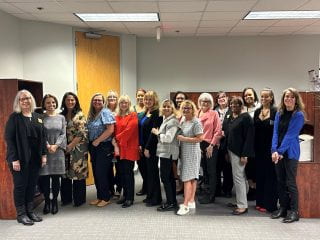Partners for Inclusive Communities (Partners), an outreach unit of the College of Education and Health Professions, has been awarded a grant for over $10 million to support children and families in Arkansas while furthering its mission to facilitate the inclusion of people with disabilities in community life.
Awarded from the AR Department of Human Services, this grant will fund three initiatives throughout a 14-month period to expand home and community-based services for children and families, including those who experience neurodevelopmental disabilities, behavioral health conditions or both.
The projects, which will be led by Partners executive director Karan Burnette and associate director Elizabeth Cleveland, are titled Prevention, Stabilization, and Support Project for Young Children (PSSP-YC), Families in Transition Teams (FiTT), and the Fetal Alcohol Spectrum Disorder (FASD) Pilot.
PSSP-YC focuses on children from birth to sixth grade and supports children and families at risk for escalation of behavior or loss of placement in childcare settings, schools or in their homes.
“This project represents a shift in philosophy and action, directing focus toward prevention by providing supports for families, including foster and adoptive, before there is an issue that creates risk for children,” Burnette said. “It will bring together multiple existing services to form a team around the children and families with everyone working toward the same goal.”
While PSSP-YC focuses mainly on helping young children, FiTT focuses on the family unit in times of significant life change.
The emphasis of FiTT will include specialized family preservation and stabilization services for children entering or transitioning in foster care, back into their biological homes, or from institutionalized settings back into their homes and communities. In collaboration with community organizations, Partners will establish FiTT Teams, which can be mobilized quickly to provide in-home support and family-to-family mentoring to assist with unplanned transition situations, promote stabilization, and determine if long-term supports are needed.
The third initiative, the FASD Pilot, will have four focus areas: expansion of diagnostic services for individuals with FASD and other neurobehavioral conditions, education of providers and families, data analysis to find the gaps in the current systems of care for individuals with overlapping symptoms of neurodevelopmental disabilities and behavioral health conditions, and a piloted intervention study with a special focus on executive function and self-regulation.
A primary goal of these three Department of Human Services initiatives will be to assist the state in identifying gaps in current systems and to make recommendations at the project’s conclusion on new services that could strengthen the home and community-based service system.
Cleveland said the new endeavors will serve as “feasibility studies,” hoping they can become statewide resources if successful.
“These projects could potentially change the landscape of what services are available for families of children that fall between the silos of ‘developmental disabilities’ and ‘behavioral health,’ while also expanding services aimed at crisis prevention in Arkansans,” she said.
With the funding for these projects now officially in effect, Partners will hire interdisciplinary teams of professionals for program development. Once new team members are hired, they’ll build training modules, develop resources, and recruit provider agencies and families who want to participate in these new programs.
Though the amount of work and short time frame may seem daunting, Cleveland emphasized the crucial role the leadership of the College of Education and Health Professions plays in their ability to execute the plans.
“The university worked really hard to make sure [Partners] had everything that we needed,” Cleveland said. “Projects of this scale don’t usually turn around this quickly, but the college advocated for everything we needed because they see the importance of this work for the citizens across the state and because they’re committed to supporting their employees.”
Partners for Inclusive Communities is a member of the Association of University Centers on Disabilities. Those interested in learning more can visit the Partners for Inclusive Communities website



